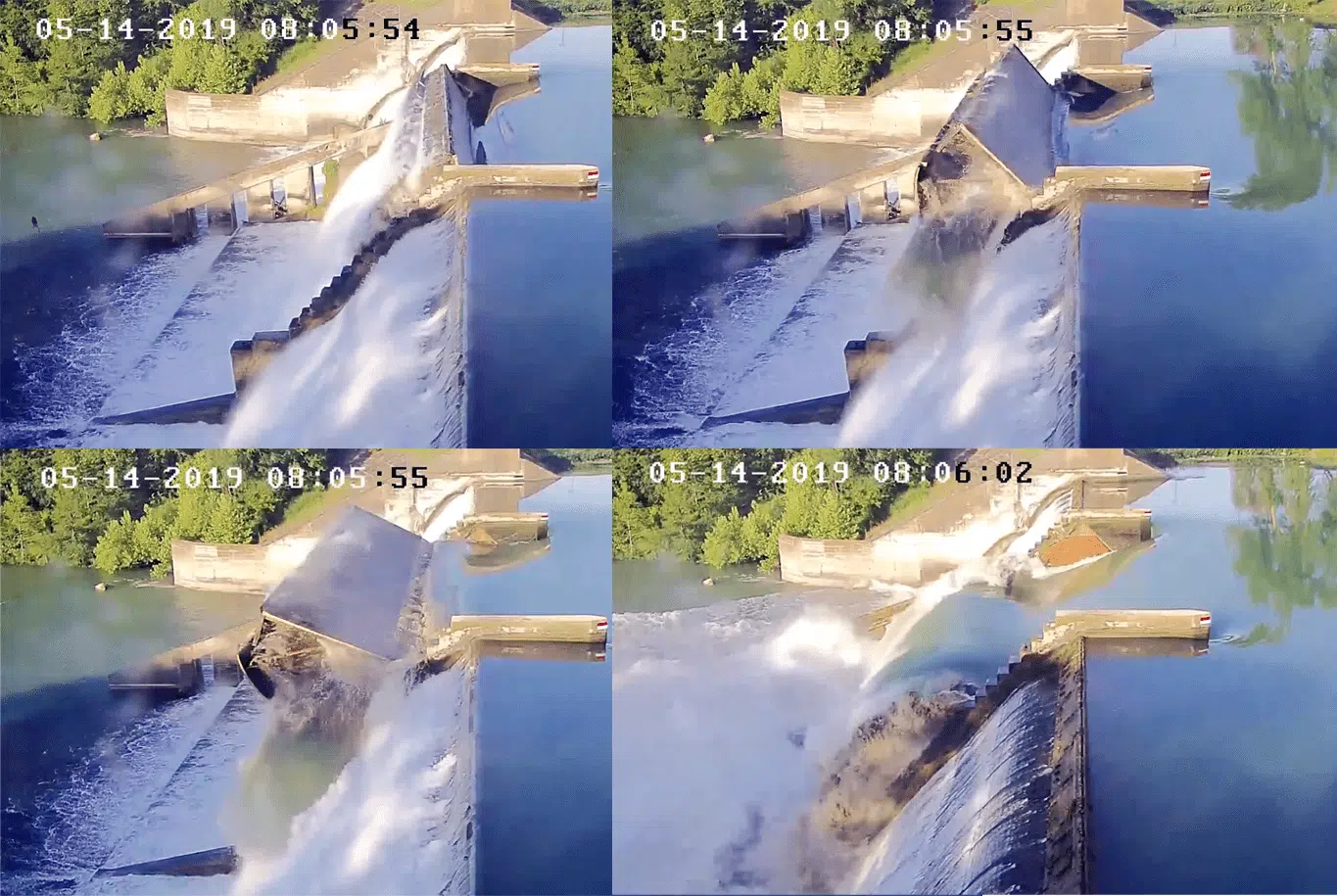(Seguin) — Lake owners and the Guadalupe-Blanco River Authority have officially started the new year by stepping back into the courtroom. It was back in September when both sides reached an agreement to delay any draining of area hydro lakes until a consensus was reached by both sides or until original plaintiffs returned to the courtroom for an October 2020 trial. Since then, the groups have returned to the Guadalupe Justice Center for a decision on a temporary restraining order as well as for an evidentiary hearing.
On Tuesday morning, Visiting Judge Stephen Ables returned to Seguin for the plaintiff’s hearing on a motion to compel as well as for GBRA’s motion for protective order on some of the items being requested by the plaintiffs’ counsel.
Continuing to represent the plaintiffs is Attorney Doug Sutter. It should be noted that Sutter also happens to own property on Lake McQueeney. A motion to compel such as in this case deals with the discovery disputes between both parties essentially asking the court to order one or both parties to take some kind of action in hopes of moving forward.
Sutter says he has struggled obtaining any requested documents from GBRA. He says after 3 and a half months, many of those documents have not been produced. However, after Tuesday’s hearing, he says he’s “very happy” with the outcome and believes he got 98 percent of what he wanted.
“The most important thing of what we really want are communications between the officers and the directors of GBRA with regard to the maintenance of the dam, the replacement of the dam and more importantly, the failure of the dam because what GBRA was willing to give us was their PowerPoint and their reports that they did after the failures and as we all know, when you have catastrophic lost like that, you can imagine what the engineers, what the officers, what the directors are all saying to each other because they’ve got to be scattering at that time to find out what went wrong. Did we do something wrong? Is it our maintenance? Is it our problem? Is it our fault? What happened? And, that’s what we have not been able to get from GBRA. What we get from GBRA are the PowerPoints that they have at the end of the day that they put on for public consumption and for press consumption. We want to see exactly the reactions that they had at the time of these failures,” said Sutter.
Sutter says he’s also pleased that he will soon have some more insight as to what the executive branch of the government thinks about the failures of the dams and who it thinks is responsible for the repairs.

“The other thing that we are going to get is we know that the executive branch of the government, Governor Abbott, has control over GBRA. It’s his entity basically and we want to see what communications that they have with their executive branch about their statutory duties and obligations with regard to these dams because we know just as recently, they were in Austin trying to obtain Swift Funds and talking to the executive branch. Their lobbyist were there. Their offices were there. We want to know what are they saying to these people about what are their obligations under the statute. Not what the lawyers all say in court is the obligation. We want to see what the state government believes and what these people believe. So, those are the two really important things that we are going to be able to get from them,” said Sutter. During the testimony, Sutter told the court that more specific requested documents are continually being denied by GBRA. He said he felt the river authority’s request for a protective order on some of these document requests is solely so it can jump ahead of everything. He says it’s as though they want to “muzzle” the plaintiffs’ side of the story. Defending the river authority’s position are newly appointed counsel for GBRA, Travis Sales and Kevin Jacobs of the law firm Baker Botts of Houston. They replace former GBRA Attorneys Lamont Jefferson and Emma Cano of JeffersonCano. Sales says keeping documents from the plaintiffs is simply not true.
“That’s incorrect and I think it’s interesting because if you heard if you were in the courtroom, we’ve produced over almost 60,000 pages of documents. Everything that we have located about the dams, we’ve said it repeatedly that ‘that’s what the subject matter of this lawsuit is about’ and we’ve produced it. It was interesting to note that Mr. Sutter had not even reviewed those documents before he filed his motion to compel — had not even finished reviewing those documents when he was talking to the court today and as you heard, when we went through the actual request, the court properly was limiting it to the dams and the lakes, the real subject of this lawsuit and where he denied the request is when they are getting off on these collateral sources about other issues for which really don’t have any relevance to the actual lake litigation. So no, he has the documents and we are supplementing that and we’ve been driving that information and will continue to provide that information. So, he has the information that they need with regard to what the court has said this lawsuit is all about and based upon on what the lawsuit actually is about,” said Sales.
Now, if it’s not GBRA muzzling the plaintiff’s, then it is GBRA who believes that the plaintiffs are trying to police its operation. Sutter responds by stating that there is clear path that the GBRA has to take in this matter.

“We aren’t trying to police how they do their jobs. What we are trying to do is to require them to do their job properly with regard to the dams. I mean they want to call it policing and I find it kind of odd when you consider the fact that they might not tax the taxpayer but they are able to take the water that is owned by the taxpayer, sell it and make the money. So, it’s taxpayers’ money and for Mr.(Kevin) Patteson to say it on the stand as he did during the last hearing to say ‘it’s none of your business,’ there are certain things in their business that might not be any of our business in certain things that they do but overall, with regard to the dams and what is going on regarding their statutory duties, it is our business. So, if they want to call that policing, they can call it policing. We call it our right under the lawsuit to obtain or to require them to do what they are supposed to do,” said Sutter. As for Sales, he says if any documents are not being forwarded upon request, it is simply because the plaintiffs are requesting information that either has already drawn a conclusion in the courts or because it is not related to the issues at hand.
“As I just mentioned, we’ve produced everything about the lakes. We’ll produce whatever we have. There’s nothing to hide about the lakes. We’ve produced it all. If he had reviewed it all before he filed a motion, I’m not sure we would have to be going through this today and so there’s not issue about that. And, if you heard going back and forth today, with the actual request to deal with the dams or the lakes — there’s no issue about that. It’s either been produced or it’s being gathered and will be produced — subject, of course, if there is something with attorneys that is privileged etc. But there is no basis to actually even have this motion today. The court did properly and we were happy and we believed that the court carefully listened and properly limited some of these things that were very personal attacks against individual directors or issues about sales of water to other customers. Those are not relevant to the issues in this lawsuit. I think the court properly limited that,” said Sales.
One of the components of the hearing also dealt with threating or inappropriate attacks against GBRA individuals.
Sales suggested that the court consider eliminating the personal attacks of those who he also represents. Those, of course, include the directors and officers of the river authority. Sales presented and submitted several pages of social media posts that threatened the lives or property of some of these individuals. In addition to the posting of personal addresses and phone numbers, some of those messages included inappropriate language and even proposed threats such as “walking intimidating dogs” by some of these individual’s properties.
Sales says in moving forward, there has to be a better way to continue for not only the efficiency of this litigation but also for the protection of all involved.
“I know that this is an emotionally charged issue for a lot of people on all different sides and issues. But this is civil litigation and I think I mentioned that in the courtroom. It needs to be conducted civilly. There were some accusations and personal attacks in the last pleading made by plaintiff’s counsel that I think went overboard. We brought those to the court’s attention. I think the court will frown upon those types of attacks and I think the court properly was going to limit some of those personal attacks on some of these personal extraneous issues. Mr. Sutter said ‘well those aren’t my clients’ and there are some and some that are not but when you are actually using that type of volatile language about people, that can be very dangerous and we don’t want anybody to step out of line,” said Sales.
Sutter says as for social media, he says he can’t control what others do.
“There really isn’t anything that we can do. I mean I looked at that in court for the first time today and I noticed whether I like it or not like it, it doesn’t have anything to do with how we are going to prosecute the lawsuit and people all have their rights to say what they want to say but at the same time, you have to look at the history of GBRA and these property owners. Even the Sunset Advisory Commission said that the communication with the owners and the taxpayers is very poor. So, our position on that is that that’s a self inflicted wound by GBRA. But again, it’s not going to have any place with regard to the way I take depositions now and proceed in court. I can’t control what people say on social media. I personally don’t get on it but that’s their right to do it but it doesn’t have any place in my lawsuit,” said Sutter.
Some might even note that the judge’s objection to deny any further release of documents on land easements is somewhat a response to what GBRA claims to have been personal attacks made against board members following the last hearing — a hearing that discussed that person’s involvement with a conservation land easement.
Other items denied include further documents showing GBRA’s water sale to the New Braunfels Utilities. The judge said the issue he believes has already been addressed and has no direct impact to the litigation before them although the plaintiffs believe that the money made by the sale only debunks the river authority’s claim that they have no money to repair the dams.
With this latest hearing behind them, Sutter says both sides can now continue their homework so that they can further proceed with the process.
“We are hoping in the next week or two, we are going to work out with counsel — we have one set that we are not going to wait for additional documents and try to get that one going but again, I will work on counsel with that, hopefully, in the next two weeks. Then after that, they have the 30 days to provide their production as well as the privilege log and then after that, we’ll start in earnest,” said Sutter.
Two of the six dams in the system have already had spill gate failures leading to the drainage of both Lake Wood in 2016 and Lake Dunlap in 2019. In the meantime, citizens on Lake McQueeney are well on their way with a process to tax themselves to raise the money for the repairs for their specific body of water.
The Guadalupe County Commissioners Court in December took action approving the request for the creation of a water control and improvement district. The action by the commissioners temporarily creates the water district known as the Lake McQueeney Water Control and Improvement District (WCID) No. 1. The court’s blessing was the first step in beginning to plan for the May 2, 2020 election in which the taxing district will be put before voters for official creation.





